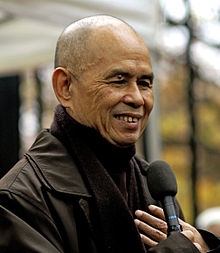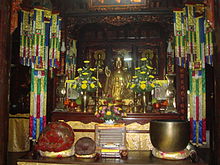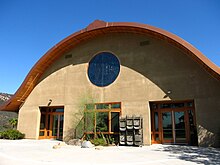Thích Nhất Hạnh | |
|---|---|
 Thích Nhất Hạnh in Paris in 2006 | |
| Title | Thiền Sư (Zen master) |
| Other names | Thầy (teacher) |
| Personal | |
| Born | Nguyễn Xuân Bảo 11 October 1926 |
| Religion | Thiền Buddhism |
| School | Linji school (Lâm Tế) Order of Interbeing Plum Village Tradition |
| Lineage | 42nd generation (Lâm Tế) 8th generation (Liễu Quán) |
| Other names | Thầy (teacher) |
| Senior posting | |
| Teacher | Thích Chân Thật |
| Based in | Plum Village Monastery (currently in Từ Hiếu Temple near Huế, Vietnam) |
Thích Nhất Hạnh (/ˈtɪk ˈnjʌt ˈhʌn/; Vietnamese: [tʰǐk̟ ɲə̌t hâjŋ̟ˀ]; born as Nguyễn Xuân Bảo on 11 October 1926) is a Vietnamese Thiền Buddhist monk, peace activist, and founder of the Plum Village Tradition.
Thích Nhất Hạnh spent most of his later life residing at the Plum Village Monastery in southwest France near Thénac, travelling internationally to give retreats and talks. He coined the term "Engaged Buddhism" in his book Vietnam: Lotus in a Sea of Fire. After a 39-year exile, he was permitted to visit Vietnam in 2005. In November 2018, he returned to Vietnam to spend his remaining days at his "root temple", Từ Hiếu Temple, near Huế.
Nhất Hạnh has published over 130 books, including more than 100 in English which have sold over 5 million worldwide. He is active in the peace movement and deep ecology, promoting nonviolent solutions to conflict and raising awareness of the interconnectedness of all elements in nature. He is the founder of the largest monastic order in the West. He also refrains from consuming animal products, as a means of nonviolence toward animals.
Biography
Nhất Hạnh was born as Nguyễn Xuân Bảo on October 11, 1926, into a large family in the ancient imperial capital of Huế in Central Vietnam. At the age of 16 he entered the monastery at nearby Từ Hiếu Temple, where his primary teacher was Zen Master Thanh Quý Chân Thật. A graduate of Báo Quốc Buddhist Academy in Central Vietnam, Thích Nhất Hạnh received training in Vietnamese traditions of Mahayana Buddhism, as well as Vietnamese Thiền, and received full ordination as a Bhikkhu in 1951.
In the following years he founded Lá Bối Press, the Vạn Hanh Buddhist University in Saigon, and the School of Youth for Social Service (SYSS), a neutral corps of Buddhist peace workers who went into rural areas to establish schools, build healthcare clinics, and help rebuild villages.
On 1 May 1966, at Từ Hiếu Temple, he received the "lamp transmission" from Zen Master Chân Thật, making him a dharmacharya (teacher). Nhất Hạnh is now the spiritual head of the Từ Hiếu Pagoda and associated monasteries.
During the Vietnam War
In 1961 Nhất Hạnh went to the US to study at the Princeton Theological Seminary, and was subsequently appointed lecturer in Buddhism at Columbia University. By then he had gained fluency in French, Classical Chinese, Sanskrit, Pali and English, in addition to his native Vietnamese. In 1963, he returned to Vietnam to aid his fellow monks in their nonviolent peace efforts.
Nhất Hạnh taught Buddhist psychology and prajnaparamita literature at Vạn Hanh Buddhist University, a private institution that taught Buddhist studies, Vietnamese culture, and languages. At a meeting in April 1965, Vạn Hanh Union students issued a Call for Peace statement. It declared: "It is time for North and South Vietnam to find a way to stop the war and help all Vietnamese people live peacefully and with mutual respect." Nhất Hạnh left for the U.S. shortly afterwards, leaving Sister Chân Không in charge of the SYSS. Vạn Hạnh University was taken over by one of the chancellors, who wished to sever ties with Nhất Hạnh and the SYSS, accusing Chân Không of being a communist. Thereafter the SYSS struggled to raise funds and faced attacks on its members. It persisted in its relief efforts without taking sides in the conflict.
Nhất Hạnh returned to the US in 1966 to lead a symposium in Vietnamese Buddhism at Cornell University and continue his work for peace. While in the US, he visited Gethsemani Abbey to speak with Thomas Merton. When the South Vietnamese regime threatened to block Nhất Hạnh's reentry to the country, Merton wrote an essay of solidarity, "Nhat Hanh is my Brother". In 1965 he had written Martin Luther King Jr. a letter titled "In Search of the Enemy of Man". During his 1966 stay in the US, Nhất Hạnh met King and urged him to publicly denounce the Vietnam War. In 1967, King gave the speech Beyond Vietnam: A Time to Break Silence at the Riverside Church in New York City, his first to publicly question U.S. involvement in Vietnam. Later that year, King nominated Nhất Hạnh for the 1967 Nobel Peace Prize. In his nomination, King said, "I do not personally know of anyone more worthy of [this prize] than this gentle monk from Vietnam. His ideas for peace, if applied, would build a monument to ecumenism, to world brotherhood, to humanity". That King had revealed the candidate he had chosen to nominate and had made a "strong request" to the prize committee was in sharp violation of Nobel traditions and protocol. The committee did not make an award that year.
Nhất Hạnh moved to France and became the chair of the Vietnamese Buddhist Peace Delegation. When the Northern Vietnamese army took control of the south in 1975, he was denied permission to return to Vietnam. In 1976–77 he led efforts to help rescue Vietnamese boat people in the Gulf of Siam, eventually stopping under pressure from the governments of Thailand and Singapore.
A CIA document from the Vietnam War has called Thích Nhất Hạnh a "brain truster" of Thích Trí Quang, the leader of a dissident group.
Establishing the Order of Interbeing
Nhất Hạnh created the Order of Interbeing (Vietnamese: Tiếp Hiện) in 1966. He heads this monastic and lay group, teaching Five Mindfulness Trainings and the Fourteen Mindfulness Trainings. In 1969 he established the Unified Buddhist Church (Église Bouddhique Unifiée) in France (not a part of the Unified Buddhist Church of Vietnam). In 1975 he formed the Sweet Potato Meditation Centre. The centre grew and in 1982 he and Chân Không founded Plum Village Monastery, a vihara in the Dordogne in the south of France. Plum Village is the largest Buddhist monastery in Europe and America, with over 200 monastics and over 10,000 visitors a year.
The Plum Village Community of Engaged Buddhism (formerly the Unified Buddhist Church) and its sister organization in France the Congregation Bouddhique Zen Village des Pruniers are the legally recognised governing bodies of Plum Village in France, Blue Cliff Monastery in Pine Bush, New York, the Community of Mindful Living, Parallax Press, Deer Park Monastery in California, Magnolia Grove Monastery in Batesville, Mississippi, and the European Institute of Applied Buddhism in Waldbröl, Germany. According to the Thích Nhất Hạnh Foundation, the charitable organization that serves as the Plum Village Community of Engaged Buddhism's fundraising arm, the monastic order Nhất Hạnh established comprises over 750 monastics in 9 monasteries worldwide.
Nhất Hạnh established two monasteries in Vietnam, at the original Từ Hiếu Temple near Huế and at Prajna Temple in the central highlands. He and the Order of Interbeing have established monasteries and Dharma centres in the United States at Deer Park Monastery (Tu Viện Lộc Uyển) in Escondido, California, Maple Forest Monastery (Tu Viện Rừng Phong) and Green Mountain Dharma Center (Ðạo Tràng Thanh Sơn) in Vermont and Magnolia Grove Monastery (Đạo Tràng Mộc Lan) in Mississippi, the second of which closed in 2007 and moved to the Blue Cliff Monastery in Pine Bush, New York. These monasteries are open to the public during much of the year and provide ongoing retreats for laypeople. The Order of Interbeing also holds retreats for specific groups of laypeople, such as families, teenagers, military veterans, the entertainment industry, members of Congress, law enforcement officers and people of colour. Nhất Hạnh conducted peace walks in Los Angeles in 2005 and 2007.
Notable members of the order of interbeing and disciples of Nhất Hạnh include Skip Ewing, founder of the Nashville Mindfulness Center; Natalie Goldberg, author and teacher; Chân Không, dharma teacher; Caitriona Reed, dharma teacher and co-founder of Manzanita Village Retreat Center; Larry Rosenberg, dharma teacher; Cheri Maples, police officer and dharma teacher; and Pritam Singh, real estate developer and editor of several of Nhất Hạnh's books.
Other notable students of Nhất Hạnh include Joan Halifax, founder of the Upaya Institute; Albert Low, Zen teacher and author; Joanna Macy, environmentalist and author; Jon Kabat-Zinn, creator of mindfulness-based stress reduction (MBSR); Jack Kornfield, dharma teacher and author; Christiana Figueres, former Executive Secretary of the United Nations Framework Convention on Climate Change; Garry Shandling, comedian and actor; Marc Benioff, founder of Salesforce.com; Jim Yong Kim, former president of the World Bank; John Croft, co-creator of Dragon Dreaming; Leila Seth, author and Chief Justice of the Delhi High Court; and Stephanie Kaza, environmentalist.
Return to Vietnam
In 2005, after lengthy negotiations, the Vietnamese government allowed Nhất Hạnh to return for a visit. He was also allowed to teach there, publish four of his books in Vietnamese, and travel the country with monastic and lay members of his Order, including a return to his root temple, Tu Hieu Temple in Huế. The trip was not without controversy. Thich Vien Dinh, writing on behalf of the Unified Buddhist Church of Vietnam (considered illegal by the Vietnamese government), called for Nhất Hạnh to make a statement against the Vietnam government's poor record on religious freedom. Vien Dinh feared that the Vietnamese government would use the trip as propaganda, suggesting that religious freedom is improving there, while abuses continue.
Despite the controversy, Nhất Hạnh returned to Vietnam in 2007, while two senior officials of the banned Unified Buddhist Church of Vietnam (UBCV) remained under house arrest. The UBCV called his visit a betrayal, symbolizing his willingness to work with his co-religionists' oppressors. Võ Văn Ái, a UBCV spokesman, said, "I believe Thích Nhất Hạnh's trip is manipulated by the Hanoi government to hide its repression of the Unified Buddhist Church and create a false impression of religious freedom in Vietnam." The Plum Village Website states that the three goals of his 2007 trip to Vietnam were to support new monastics in his Order; to organize and conduct "Great Chanting Ceremonies" intended to help heal remaining wounds from the Vietnam War; and to lead retreats for monastics and laypeople. The chanting ceremonies were originally called "Grand Requiem for Praying Equally for All to Untie the Knots of Unjust Suffering", but Vietnamese officials objected, calling it unacceptable for the government to "equally" pray for soldiers in the South Vietnamese army or U.S. soldiers. Nhất Hạnh agreed to change the name to "Grand Requiem For Praying".
Other
In 2014, major Jewish, Islamic (Muslim), Hindu, Buddhist, Anglican, Catholic and Orthodox Christian leaders met to sign a shared commitment against modern-day slavery; the declaration they signed calls for the elimination of slavery and human trafficking by 2020. Nhất Hạnh was represented by Chân Không.
Health
In November 2014, Nhất Hạnh experienced a severe brain hemorrhage and was hospitalized. After months of rehabilitation, he was released from the stroke rehabilitation clinic at Bordeaux Segalen University, in France. On July 11, 2015, he flew to San Francisco to speed his recovery with an aggressive rehabilitation program at UCSF Medical Center. He returned to France on January 8, 2016.
After spending 2016 in France, Nhất Hạnh travelled to Thai Plum Village. He has continued to see both Eastern and Western specialists while in Thailand, but is unable to speak.
On 2 November 2018, a press release from the Plum Village community confirmed that Nhất Hạnh, then aged 92, had returned to Vietnam a final time and will live at Từ Hiếu Temple for "his remaining days". In a meeting with senior disciples, he had "clearly communicated his wish to return to Vietnam using gestures, nodding and shaking his head in response to questions." A representative for Plum Village, Sister True Dedication, has described his life in Vietnam (referring to him as "Thay" which is Vietnamese for "Teacher"):
"Thay’s health has been remarkably stable, and he is continuing to receive Eastern treatment and acupuncture," wrote Plum Village representative Sister True Dedication in an email. "When there’s a break in the rains, Thay comes outside to enjoy visiting the Root Temple’s ponds and stupas, in his wheelchair, joined by his disciples. Many practitioners, lay and monastic, are coming to visit Tu Hieu, and there is a beautiful, light atmosphere of serenity and peace, as the community enjoys practicing together there in Thay’s presence."
Approach
Thích Nhất Hạnh's approach has been to combine a variety of teachings of Early Buddhism, Mahayana Buddhist traditions of Yogācāra and Zen, and ideas from Western psychology to teach mindfulness of breathing and the four foundations of mindfulness, offering a modern light on meditation practice. His presentation of the Prajnaparamita in terms of "interbeing" has doctrinal antecedents in the Huayan school of thought, which "is often said to provide a philosophical foundation" for Zen.
In September 2014, shortly before his stroke, Nhất Hạnh completed new English and Vietnamese translations of the Heart Sutra, one of the most important sutras in Mahayana Buddhism. In a letter to his students, he said he wrote these new translations because he thought that poor word choices in the original text had resulted in significant misunderstandings of these teachings for almost 2,000 years.
Nhất Hạnh has also been a leader in the Engaged Buddhism movement (he is credited with coining the term), promoting the individual's active role in creating change. He credits the 13th-century Vietnamese king Trần Nhân Tông with originating the concept. Trần abdicated his throne to become a monk and founded the Vietnamese Buddhist school of the Bamboo Forest tradition.
Names applied to him
The Vietnamese name Thích (釋) is from "Thích Ca" or "Thích Già" (釋迦, "of the Shakya clan"). All Buddhist monastics in East Asian Buddhism adopt this name as their surname, implying that their first family is the Buddhist community. In many Buddhist traditions, there is a progression of names a person can receive. The first, the lineage name, is given when a person takes refuge in the Three Jewels. Nhất Hạnh's lineage name is Trừng Quang (澄光, "Clear, Reflective Light"). The next is a dharma name, given when a person takes additional vows or is ordained as a monastic. Nhất Hạnh's dharma name is Phùng Xuân (逢春, "Meeting Spring"). Dharma titles are also sometimes given; Nhất Hạnh's dharma title is Nhất Hạnh.
Neither Nhất (一) nor Hạnh (行)—which approximate the roles of middle name or intercalary name and given name, respectively, when referring to him in English—was part of his name at birth. Nhất (一) means "one", implying "first-class", or "of best quality"; Hạnh (行) means "action", implying "right conduct" or "good nature." Nhất Hạnh has translated his Dharma names as Nhất = One, and Hạnh = Action. Vietnamese names follow this naming convention, placing the family or surname first, then the middle or intercalary name, which often refers to the person's position in the family or generation, followed by the given name.
Nhất Hạnh's followers often call him Thầy ("master; teacher"), or Thầy Nhất Hạnh. Any Vietnamese monk or nun in the Mahayana tradition can be addressed as "thầy". Vietnamese Buddhist monks are addressed thầy tu ("monk") and nuns are addressed as sư cô ("sister") or sư bà ("elder sister"). On the Vietnamese version of the Plum Village website, he is also called Thiền Sư Nhất Hạnh ("Zen Master Nhất Hạnh").
Relations with Vietnamese governments
Nhất Hạnh's relationship with the government of Vietnam has varied over the years. He stayed away from politics, but did not support the South Vietnamese government's policies of Catholicization. He questioned American involvement, which put him at odds with the Saigon leadership. In 1975, he fled the country, not to return till 2005.
His relations with the communist government ruling Vietnam is also edgy due to its atheism, though he has little interest in politics. The communist government is therefore skeptical of him, distrusts his work with the overseas Vietnamese population, and has several times restricted his praying requiem. Nonetheless, his popularity has often affected the government's policies.
Awards and honors
Nobel laureate Martin Luther King Jr. nominated Nhất Hạnh for the Nobel Peace Prize in 1967. The prize was not awarded that year. Nhất Hạnh was awarded the Courage of Conscience award in 1991.
Nhất Hạnh received 2015's Pacem in Terris Peace and Freedom Award.
In November 2017, the Education University of Hong Kong conferred an honorary doctorate upon Nhất Hạnh for his "lifelong contributions to the promotion of mindfulness, peace and happiness across the world". As he was unable to attend the ceremony in Hong Kong, a simple ceremony was held on 29 August 2017 in Thailand, where John Lee Chi-kin, vice-president (academic) of EdUHK, presented the honorary degree certificate and academic gown to Nhất Hạnh on the university's behalf.
Film
Nhất Hạnh has been featured in many films, including The Power of Forgiveness, shown at the Dawn Breakers International Film Festival.
He also appears in the 2017 documentary Walk with Me directed by Marc J Francis and Max Pugh, and supported by Oscar-winner Alejandro Gonzalez Inarritu. Filmed over three years, Walk With Me focuses on the Plum Village monastics' daily life and rituals, with Benedict Cumberbatch narrating passages from "Fragrant Palm Leaves" in voiceover. The film was released in 2017, premiering at SXSW Festival.
Graphic novel
Along with Alfred Hassler and Chân Không, Nhất Hạnh is the subject of the 2013 graphic novel The Secret of the 5 Powers.





